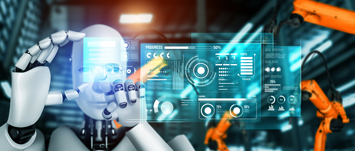
Slow data is a business hazard. Fortunately, more organizations are shifting to AI solutions to mitigate this menace. Yet, 150 executives working at leading North American and European companies highlighted in a 2023 McKinsey survey reveal that many organizations are still struggling to figure out AI implementation at scale. Approximately 24% have piloted use cases, whereas 63% are still in the exploratory stage. Several

Companies are turning to technology, particularly evolving their strategies to implement Robotic Process Automation (RPA), with a vision of automating repetitive tasks, a crucial aspect of the modern business landscape. Implementing a structured approach like the Automation Factory Model helps enterprises automate operations with improved productivity, better quality, and lower expenses. Automation Evangelist, who advocates for automation, plays a key role in connecting the

The automation landscape is evolving rapidly. This transformative phase has further accelerated with the pairing of RPA and AI/ GenAI. Thanks to this powerful technological fusion, businesses can effortlessly streamline routine task automation and achieve high productivity and efficiency. Harvard Business Review mentions that over 90% of employees feel that automation solutions have amplified their productivity. 90% trust automation to complete a larger number

Data lies at the core of digital transformation. Yet 91% of respondents in a survey reported that poor data quality affects their operations. Another 2023 Adobe Acrobat survey posits that 48% of people experience struggle to retrieve information from relevant documents. It leads to challenges like error-prone manual data entry, arduous document review, poor scalability, among others. Read on to learn about the challenges

Companies throughout industries produce large volumes of unstructured communications data, from emails, messages tickets, and customer services to sales and order management processes, shipping information customer and vendor communications in manufacturing. Approximately 80-90% of enterprise data are unstructured, and the volume will grow to 175 zettabytes by 2025. Only 20% of the data is structured. Poor communications data leads to issues like delayed response,

The demand for automation continues to skyrocket in 2024. Furthermore, considering the demand for agile workflow and reduced time-to-market deliverables in the digitized era, the surge of cognitive automation is expected to continue for the long term. A 2023 Forrester survey states that more than 56% of businesses strive for process improvement. 71% of organizations agree that end-to-end automation is a crucial driver of

In today’s rapidly evolving technological landscape, the integration of Artificial Intelligence (AI) into automation processes is transforming the way businesses operate. Recent data from Automation Anywhere underscores the impact of this shift: 78% of enterprises report significant productivity gains due to automation. With 72% of organizations planning investments in AI/ML for the upcoming year and 40% already deploying Generative AI (GenAI) solutions, it’s clear

The wave of GenAI has rapidly transformed the healthcare industry. Healthcare organizations worldwide are increasingly adopting Generative AI not simply as a tool but as a powerful aid to collect information and knowledge, leading to the development of best healthcare practices. The trend is reflected in a December 2023 Gartner survey. It shows that 84% of healthcare provider executives strongly feel that LLMs (large

Introduction to GenAI and GenAI RPA Generative Artificial Intelligence (GenAI) refers to a subset of artificial intelligence that can generate new content, such as textual content, pix, or even code, based on the facts it has been educated on. Unlike traditional AI, which specializes in recognizing styles and making predictions, GenAI can create original material that mimics human creativity and selection-making processes. When incorporated





